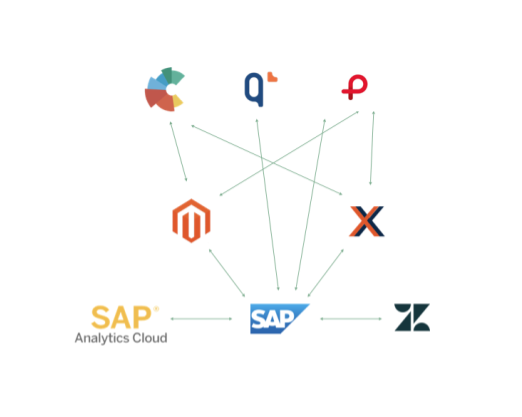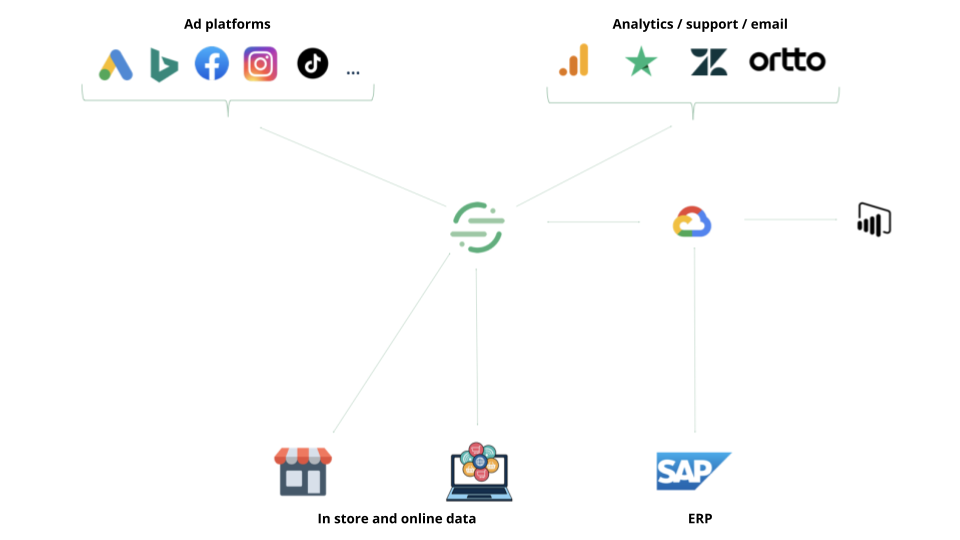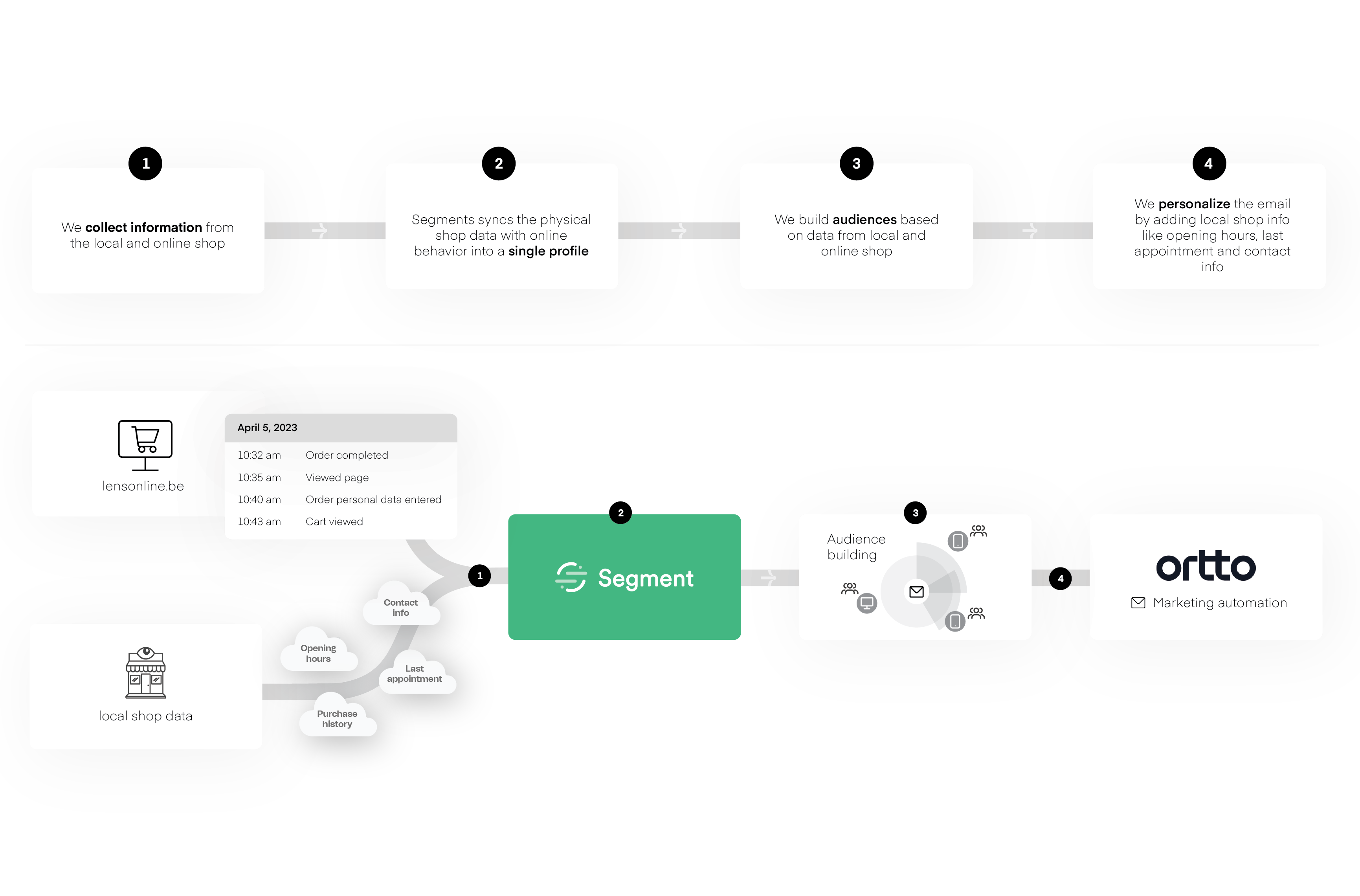Time to read: 6 minutes
The big win
When LensOnline entered the Dutch market, they employed a broad, catch-all marketing strategy to acquire customers as they had no real way to target potential buyers. This heavy above-the-line marketing cost multiple million euros and was thus by definition temporary. The initial approach for the Dutch market was successful, but wasn’t replicable for more competitive and larger markets such as Germany, another target country on the LensOnline roadmap.
Recognizing this, LensOnline turned to Twilio Segment to unify and activate customer data, aiming for more precise, efficient digital advertising and personalized customer communication to generate the most relevant leads, instead of expensive broad reach campaigns like TV and radio ads. This new strategy not only honed their marketing efforts but also reduced their marketing spend by 15%, while still achieving double digit growth— growing over 10% in 2023.
Reflecting on this shift, Pascal Sabbe, CMO and CDO at LensOnline noted, "Segment didn't just refine our marketing approach; it revolutionized it. We are not just preparing for geographical expansion; we're advancing with a data-first, customer-centric strategy across the company, thanks to Segment."
Table of Contents
- The composable, flexible data ecosystem
- Revolutionizing marketing with precision: A data-driven strategy
- What’s next?
LensOnline, the flagship subsidiary of LensGroup, is the first and largest omnichannel contact lens and eye care provider in the Benelux region, operating in Belgium, the Netherlands, and Italy (under 1000Lenti). LensOnline has carved a niche for itself by offering an extensive range of contact lens brands at competitive prices, combined with an extensive service offering of over 1000 opticians and optometrists. With a network of over 260 branches and partnerships with expert opticians, they are the trusted name for individuals looking to find the best vision solution.
To maintain this customer trust and expand their customer base, LensOnline recognized the need to transform their marketing strategy. Despite being at the forefront of modern retail since 2016 having invested in the standard tech stack, the company faced a significant challenge: a highly dispersed and underutilized wealth of customer data. The consequence was an unsustainable marketing strategy, marked by an annual spend of €3 million and a broad, unfocused reach.
So, LensOnline initiated a shift towards precision marketing to truly connect with customers, essential for their planned expansion into the German market. Pascal noted, "While our previous tech stack, including multiple commerce platforms, a CRM, SAP, Zendesk, etc. supported our early growth, it wasn't enough for our future ambitions. We needed to not just understand but anticipate our customer's needs. This realization led us to Twilio Segment, moving beyond traditional CRMs to a 360-degree view of customers, integrating every customer interaction and preference with a customer data platform."

Figure 1: LensOnline’s tech stack pre-Segment

Figure 2: LensOnline’s modern customer data foundation with Segment
Selecting the right partners was crucial. LensOnline, alongside The Reference (a full-service digital agency, specializing as a Strategic Integration partner in digital transformation) carefully considered its options before choosing Segment. They had an extensive list of requirements the new architecture had to deliver:
-
Scalability: Capability to accommodate current and future growth in the customer base.
-
Flexibility: Ability to support cross-business strategies and enable cross-functional collaboration.
-
Simplified architecture: Elimination of point-to-point integrations, with a focus on making architectural components easily interchangeable.
-
Enhanced security: Robust protection of data and compliance with GDPR regulations.
-
Unified customer profiles: Availability of comprehensive customer profiles across all present and future marketing channels and tactics.
-
Bi-directional data warehouse connection: A seamless, plug-and-play connection with the data warehouse to facilitate the execution of data enrichment algorithms.
-
Seamless integration with new platforms: Smooth integration with upcoming commerce and marketing platforms to enhance personalization capabilities.
Segment addressed all of LensOnline's needs, significantly in how it efficiently links data management with data warehousing benefits like bi-directional data sharing, leading to improvements that span beyond marketing, to create a more unified, informed, and customer-focused business environment. Another notable advantage was Segment's regional infrastructure with a data center located in the EU, ensuring that customer data is managed securely and in compliance with strict privacy regulations.
The composable, flexible data ecosystem
Before integrating Segment, LensOnline grappled with siloed data trapped within various systems, posing a significant barrier to harnessing actionable insights. This data, though rich and extensive, was inaccessible and unstructured, limiting its potential for driving informed business decisions.
Pascal explained “Typically with CRMs, data enters into the system and remains locked, making it challenging to utilize it across the organization. Unlike the open architecture of Segment, which allows for the free flow of data both inwards and outwards.” This 'one-way train' of data flow highlighted the necessity for a more extensible, complete solution, steering LensOnline towards Segment's open, flexible platform, capable of unifying and activating data across the entire organization.
LensOnline kicked off the Segment implementation by orchestrating data pipelines in a low-code environment, such as POS data from its 260+ retail store, its data warehouse — BigQuery, websites, and advertising platforms. By connecting online and offline data they were able to start building a multichannel experience, a crucial element in today's retail landscape.
With unified customer data now in place, data is being enriched in real-time with algorithms running in the cloud. They applied homegrown machine learning models to this structured data, enriching it with insights that could refine marketing efforts, such as determining the optimal timing for customer communications without being intrusive and predicting purchase patterns for each customer to better plan stock levels.
Revolutionizing marketing with precision: A data-driven strategy
LensOnline’s marketing team utilized Segment for a more data-driven and cost-effective marketing strategy, successfully reducing their marketing spend by 15% YoY, while still achieving double digit growth—growing over 10% in 2023. By implementing Segment, they've pivoted from a 'big bang' marketing blast—think TV, radio, and mass emails—to a sharper, digital-first strategy. This included personalized email sequences, targeted promotions, and reallocated a proportion of budget to paid ads. And Segment's robust unification of customer data has enabled them to experiment with remarketing campaigns on platforms like Meta.
Moreover, Segment's dynamic data management ensures that every crucial customer interaction, whether online or in-store, is captured and immediately reflected across the system. This real-time update of customer profiles, enriched with AI algorithms, allows LensOnline to automate personalized communications, like review requests post-purchase, and actively identify and engage customer segments for targeted campaigns. They also synthesized behavioral data from local stores and digital touchpoints to build personalized email campaigns. Beyond just purchase history, these emails were enriched with details specific to the customers' local store interactions—right down to store hours and recent visits, all collected by Segment.

Figure 3: Unified customer data flow with Segment
LensOnline's use of Segment extends to driving repeat purchases and re-engaging lapsed customers. They can now intelligently recommend complementary products or replenishments at the right time, thanks to their proprietary algorithms fed by Segment data. This level of personalization and timely engagement is set to evolve further as they plan to transition from Ortto to Segment Journeys within Twilio Engage (a data-first multichannel marketing solution).
Building on this momentum, LensOnline's new marketing strategy paves the way for ambitious market expansion. The shift towards a more targeted and data-driven marketing approach is not just about enhancing customer engagement; it's about laying the groundwork for sustainable growth into new territories. Faced with the challenge of scaling their operations, especially considering the substantial investment required for entering markets like Germany, LensOnline is now well-equipped. The shift away from a one-size-fits-all marketing strategy, is steering the company towards a more sustainable and focused market penetration. This strategic recalibration is key as LensOnline eyes the German market, aiming for a more cost-effective and impactful entry.
Since introducing these new marketing strategies, LensOnline hasn't missed a single monthly target, a success partly attributed to the improved data quality provided by Segment.
What’s next?
Looking ahead, LensOnline is poised to further refine its customer engagement strategy with Segment. Key initiatives include targeting cart abandoners, enhancing their replenishment system using their own algorithms fed by Segment data and build Journeys for more dynamic customer interactions. They're also focusing on analyzing user behavior to empower opticians with data-driven product suggestions, and orchestrating sophisticated marketing journeys that respond to individual customer actions and preferences. Additionally, LensOnline aims to integrate various communication channels like email, SMS, WhatsApp, and push notifications, ensuring that every customer interaction is timely and effective.
Interested in hearing more about how Segment can help you?
Connect with the team to learn how 25,000+ companies use Segment's extensible, scalable platform to turn customer data into revenue-generating experiences.
Thank you, you’re all set!
We'll get back to you shortly. For now, you can create your workspace by clicking below.